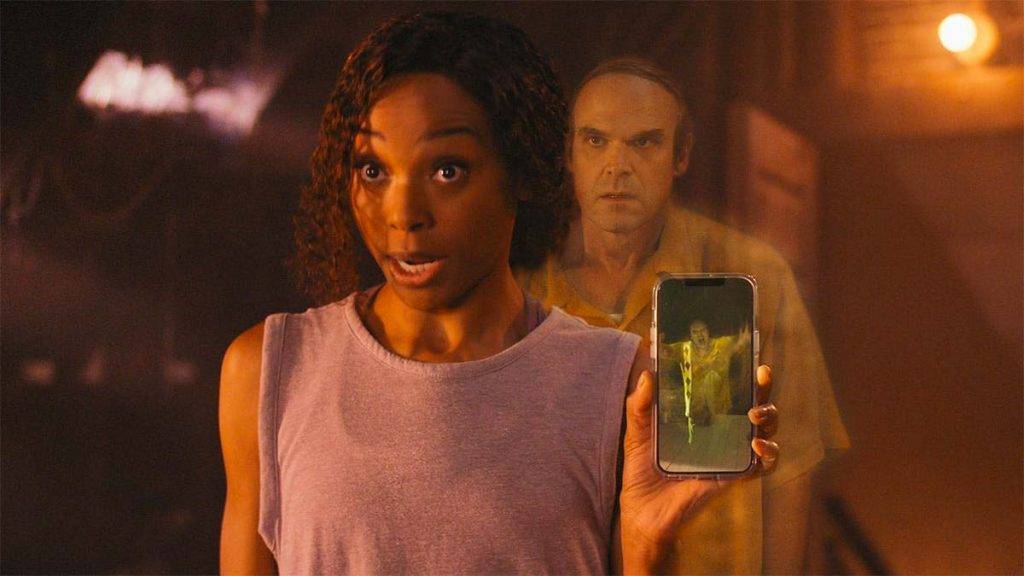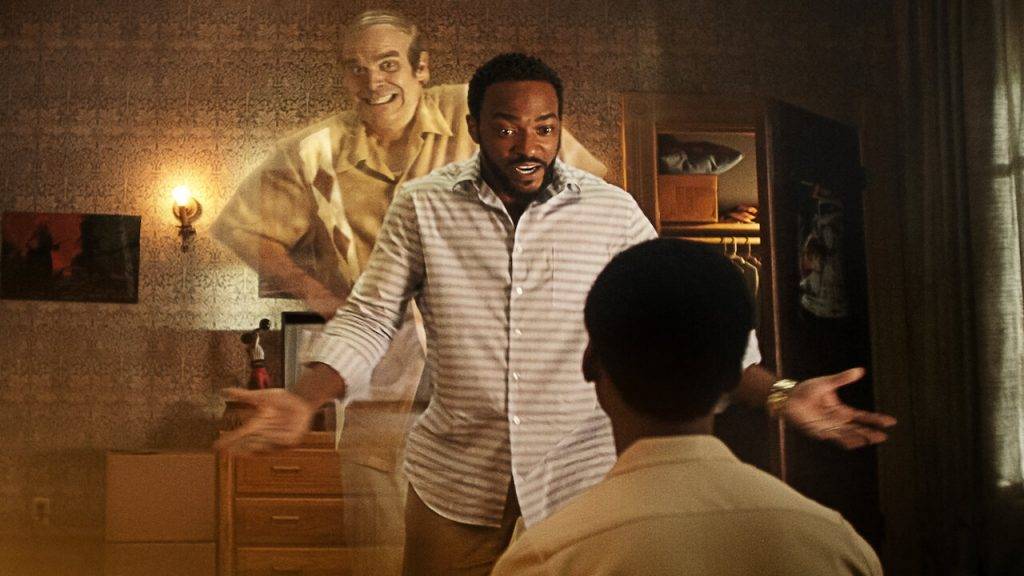Phantasmic: Frank, played by Anthony Mackie, and Ernest the ghost, played by David Harbour, in ‘We have a Ghost’. Photo: Netflix
We Have A Ghost, which premiered on Netflix in February, is the latest offering from director Christopher Landon of Freaky, Paranormal Activity and Disturbia fame.
When a family moves into a fixer-upper house, the teenage son Kevin (Jahi Di’Allo Winston) discovers a ghost named Ernest (as per the name on his bowling shirt) in the attic. Ernest (David Harbour), attempts to scare Kevin but he bursts out laughing and films the encounter for social media.
Kevin soon realises Ernest can’t talk or recall anything from his previous life and makes it his mission to help him piece the puzzle together.
The clip of Ernest goes viral and Kevin’s dad Frank (Anthony Mackie) decides to monetise Ernest’s paranormal appearance by negotiating deals that could be life-changing for him and his family.
Kevin’s mom (Erica Ash) is not with it though. She reacts like any normal person would if they encountered a ghost in their home and makes a valid comment: “We are not going to be like every stupid white family in every horror film. We are leaving!”
Ernest quickly becomes a superstar, going viral on TikTok and having challenges named after him. People advocate for “ghost rights”, with one TikToker saying: “Just because you’re not made of matter, it doesn’t mean you don’t matter.” Clever and hilarious.
However, things go wrong when Kevin and his neighbour and love interest Joy (Isabella Russo) investigate Ernest’s past and find themselves the target of the CIA.
Okay, as you’ve gathered, there is a lot going on in this movie. We Have A Ghost is way too long. The early plot twists are interesting but the movie gets overloaded with never-ending, and often predictable, developments. The comedic offering also fades when you are halfway through because the movie is so drawn out.
“The longer it goes on … the more difficult it becomes to discern what We Have A Ghost is even going for. On a tonal level, it’s more akin to a feature-length episode of Are You Afraid of the Dark? than any horror-comedy in recent memory, its 127-minute runtime stretching like so much ectoplasm as Kevin tries to help solve the mystery of Ernest’s life and death,” said Variety magazine.
“Rarely ha-ha funny and never scary, it’s ultimately more sentimental than anything else — a clunky approach that undermines its strong performances.”
I give the cinematography a solid seven out of 10. It moved seamlessly from one angle to the next, one scene to the next. The colour grading was beautiful and the emphasis on orange, red and grey worked in this film.
Would I watch it again? Probably not. Super-dense, with too many plot twists, it’s way too long for this genre. — Lesego Chepape


We Have A Ghost shows audiences what happens when you try to capitalise on those in the afterlife in the age of internet virality and stardom. The Netflix film, directed by Christopher Landon, gives E.T. meets Stranger Things meets GhostBusters vibes. But don’t expect spooky. It is a serviceable, family-friendly, entertaining comedy that is not scary at all.
It follows the usual haunted-house formula. The Presley family moves into a run-down and (obviously) haunted house that they snatched up at a surprisingly good price, due to the secrets it holds, which the neighbourhood’s newcomers don’t know about … yet.
The film is a confusing blend of genres where family dynamics meet comedy, and supposedly horror, meaning it is never fully in any of those worlds.
Frank Presley (Anthony Mackie) is the typical flawed father whose family suffers because of his frequent career changes.
The teenage protagonist, Kevin Presley (Jahi Di’Allo Winston) is that angsty youngest son who is enraged at having to move homes yet again because of his father.
When exploring their new home, the Presley children make their way to the attic, which turns out to be haunted by a friendly ghost, Ernest (David Harbour). Kevin is not scared but does what any 21st-century youngster would do — pulls out his phone to document the experience.
Ernest is mute. His drawing shapes on fogged-up glass, mouthing words and making “oogly-googly” sounds is an injustice to the charismatic Harbour. Despite this, he does a good job as you’re never scared of him.
When Frank sees Kevin’s video of Ernest, his make-cash-quickly brain starts churning, sending the clip of Ernest viral.
The film will go down well with young audiences for its meme-ification of the “ghost caught on tape” genre. But for film buffs, spoiled with cerebral ghostly movies, the nuggets that sprinkle the film, which are supposed to jog Ernest’s memory, aren’t compelling or well thought out. They are bland.
Again, the genre-blending dilutes the potential for deeper storyline exploration. The block in the father-son relationship is a valid storyline deserving of a deeper look as a cathartic narrative for the film’s younger and family-friendly audience. The father who profits off of his son’s discovery of a ghost mirrors Ernest’s long-lost memory of his daughter, a relationship he took for granted.
Although the mysteries of Ernest’s life in the human world are dull, they aren’t overly intricate as to undercut each other, but are at least synergetic. The piecing together of Ernest’s backstory tells audiences that sometimes jogging your memory can set you free but you don’t have to do it alone.
You can’t help becoming impatient for the film to get a little bit scarier or edgier because of its slow tempo. — Kimberley Schoeman